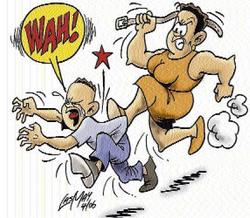Merylyn Campbell-Flinch, Contributor

This is the second of a two-part series on corporal punishment. The first part was carried on July 7.
The reality is that persons cannot give what they do not have. Honestly, how many of us wished our parents or guardians had used a different method, other than corporal punishment, to correct us when we made our mistakes?
Do you remember telling yourself that you would not use a certain method when you grow up, only to find yourself reverting to the said method in trying to correct your children? You did because that was the only method you knew.
Possibly, you were not taught alternatives to corporal punishment, such as time out (for children up to age four, and not more than one minute more than the age of the child!), denial of privileges, providing natural and logical consequences, holding family meetings, developing behavioural charts and replacing negative time with positive time, just to name a few.
Consistency is key
Being inconsistent in our dealings with children has always proved damaging to the process of discipline. For example, the parent who tells the child that he will not go to the party if he does not complete a certain task, but sends the child even though the task is not done has failed to discipline the child. Parents who say one thing but mean another, or fail to follow through on their promises, also have difficulty rearing a disciplined child.
Much debate has gone on about the after-effects of corporal punishment. Counselling clients both here in Jamaica and when I resided in United States has left me with little, if any doubt, as to the damaging effects of corporal punishment. I remember a client who was extremely angry to the point of being afraid of himself. It was discovered that he was angry with his father for his use of corporal punishment.
At the age of nine, the boy vowed to kill his father. He ran away from home at 13. When he was 21 years old, his father died. Now, he was angry because he did not get to kill his father - an idea he cherished since he was nine.
Behaviour is said to be the language of the child; the adult should try to rightly interpret the child's behaviour, and not try to use punishment as a Band-Aid.
In doing so, the child may stop the behaviour temporarily, but the reason for the behaviour may still exist, leading to the resurfacing of the same behaviour at another time.
Attention
Twelve-year-old Jane* was being sexually abused by her father since she was eight. As a result, she had difficulty concentrating in school, but was constantly whipped by her teacher for not paying attention in class. Pauline* would cry in bed every night until she was slapped by an adult. That was her way of getting someone's attention before she went off to sleep each night!
How many times have children hit each other because they disapprove of something the other child was doing? They resort to hurting the offender because that's the way they learned how to deal with disagreement and conflict. Adults are always teaching their children by modelling!
Hurting
So many of our children are starved of love and attention. They lack purpose for their lives because they think no one really cares. They are constantly beaten up and abused. They are hurt at home. They are hurt at school. They are hurt by society, including the Church! Theirs are the angry, lonely voices crying out in our marketplaces, on street sides, asking us to stop abusing them, begging us to listen to their cry. Are we listening?
Who is there to listen to the children, to discipline them by teaching them, to correct them in love when they err; to help them, in all of this, to feel loved, responsible capable and worthwhile? The fact is, the adults in these children's lives are challenged to find creative methods for dealing with inappropriate behaviours and silly mistakes.
Parents, teachers, clinicians, pastors, we all need to show that we have emancipated ourselves from all forms of slavery by speaking out against the intergenerational cycles of abuse and violence that are so prevalent in our homes and in our society. Let us rise to the challenge. Our children will feel better about themselves and society will be better off for it!
*Name changed to protect identity.

POSITIVE Parenting
What's your view on corporal punishment? Is it a tried and true method of punishment or an archaic means of behaviour modification? Email feedback to letters@gleanerjm.com.
Merylyn Campbell-Flinch has a Bachelor of Arts degree in theology and a Master of Arts degree in educational and developmental psychology. She is an assistant professor in the Behavioural Sciences Department at Northern Caribbean University. Email merylyn.flinch@ncu.edu.jm or columns@gleanerjm.com.

